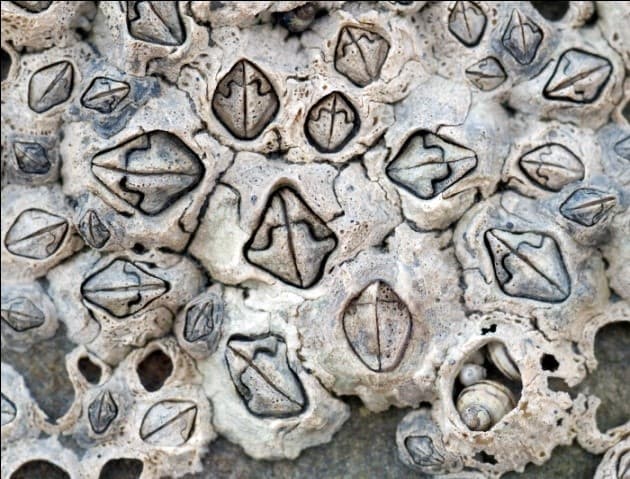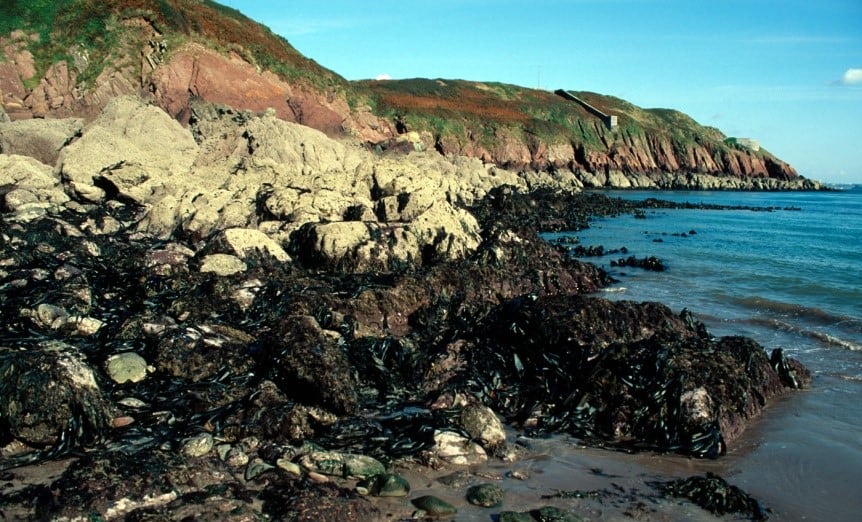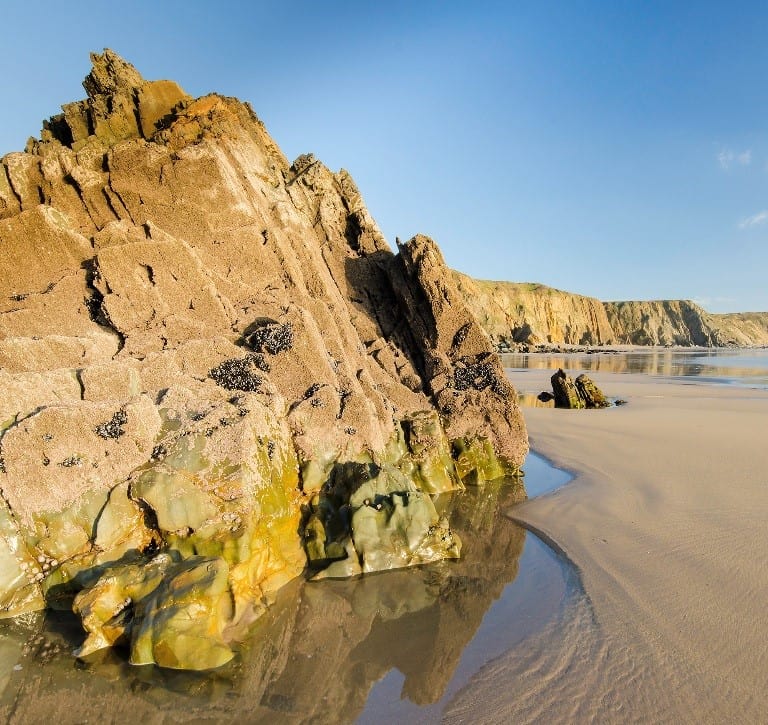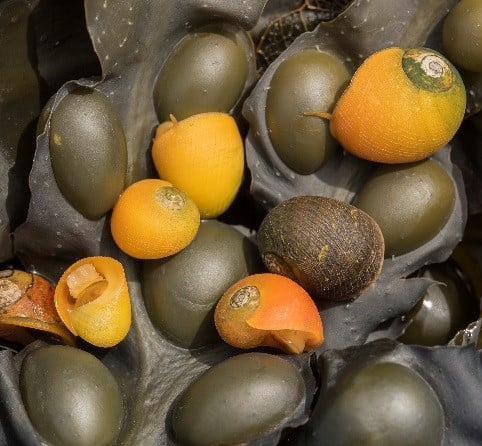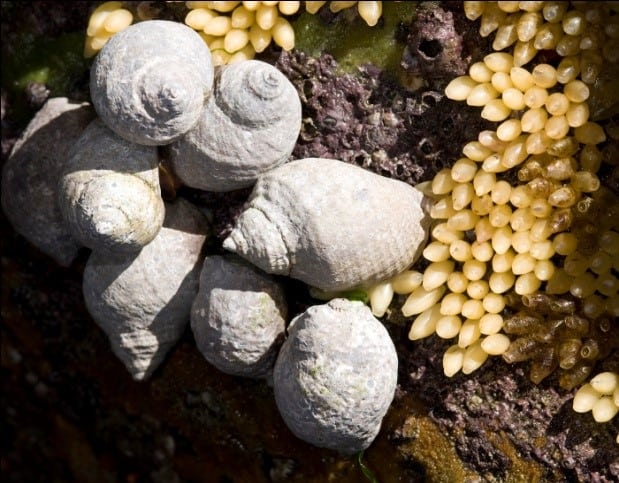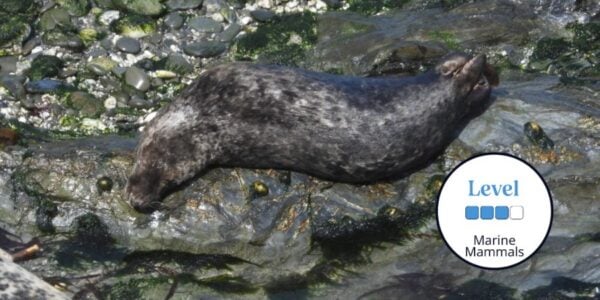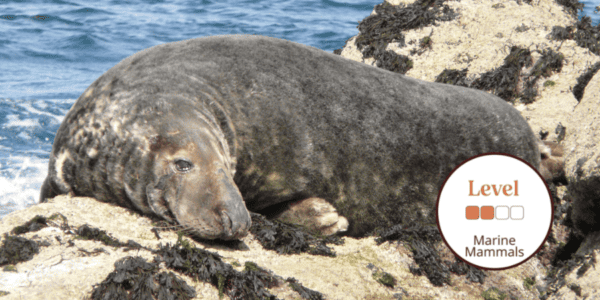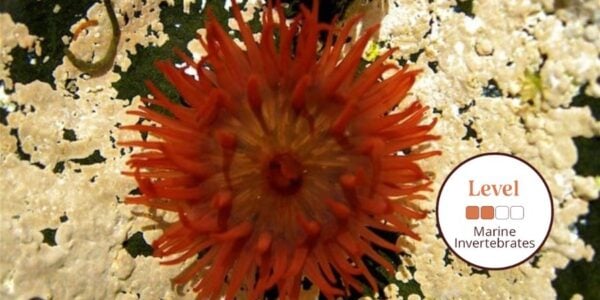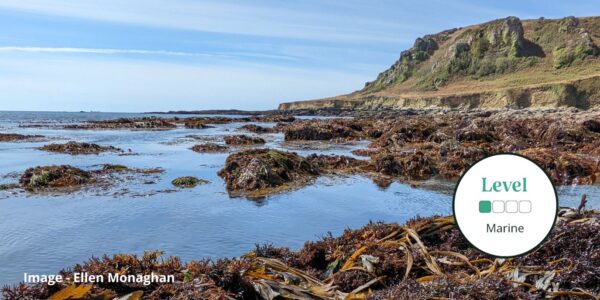In this beginner marine course, you will have the chance to explore life on the rocks and in the pools, encountering many of the species that are characteristic of the coast. The rocky shoreline of south Devon is home to a remarkable diversity of organisms.
Learning to name the species you find is an important step in understanding the environment around you.
This beginner marine course will immerse you in the rocky shores of South Devon and teach you how to identify the marine organisms that live there. The course will be entirely based in the field – finding animals and seaweeds and identifying them using keys. Throughout the course, you will learn your way around identification guides and gain practice in using keys. The course will also include discussions around aspects of rocky shore ecology and marine conservation as well as an overview of how species have become adapted for an aquatic life.
Your course will take place within the South Devon Area of Outstanding Natural Beauty close to field sites in Dartmoor National Park and urban centres in Plymouth and Torbay.
PLEASE NOTE: The course fee is for tuition only. If you would like to book accommodation, lunch and an evening meal at Slapton Ley, please email [email protected]
If you are interested in taking your interest in marine environments a step further, learning how to use identification keys and understanding marine ecology then this is the course for you.
Who Should Attend?
Nature enthusiasts, Students, Early career ecologists, Citizen scientists, Volunteer surveyors, Land managers
Knowledge Level
Beginner. Level descriptors can be found on the following webpage: Framework and Course Level Descriptors
Prior Knowledge
A basic understanding of marine environments and terminology would be beneficial for this course, though no specific experience is needed. Just a willingness to explore and learn.
What will be covered during this course?
-
- An overview of the ecology and conservation of rocky shores
- Identification of the major animal groups of the shore
- How to use identification guides and keys
By the end of the course, you will be able to:
-
- Explain the ecology of the rocky shore
- Describe key characteristic species
- Confidently use identification keys to identify a range of marine organisms
- Share this knowledge with friends, family, and fellow volunteers
The course gives you the opportunity to immerse yourself in a new subject and acquire novel skills. Our fantastic tutor will combine the use of classroom-led learning and outside learning opportunities to give individuals the skills and confidence to progress their learning.
-
- See the ‘Example Timetable’ and ‘What’s Included’ sections below for more information about this course.
- Upon booking you will need to provide individual details of all attendees
- Please email [email protected] if you have any questions.
Group Bookings Made Easy
If you have a group of 10 or more individuals wanting to complete one of our courses, our team are available to discuss your options – from discounts to private team courses.
-
- Discounted rates
- Privately run courses for your group
- Bespoke courses developed specifically for your needs
If we are unable reach viable numbers for this course, we will inform you of the course cancellation 14 days prior to the course run. We would recommend when purchasing accommodation and/or travel you should take out your own insurance.
Tutor: Ian Powell
Ian Powell is a former ecology tutor with the FSC at Slapton Ley and on overseas courses to South America. He now teaches undergraduate and masters courses in conservation biology at Edge Hill University and carries out botanical and butterfly surveys and research in the Yorkshire Dales National ParkBook with Confidence
We understand the difficulties of making plans in the current situation when guidelines continue to change, and insurance conditions are being tightened. In response, we will continue to offer additional flexibility. Find out more here
Example Timetable
Example Timetable
This timetable is subject to change but should give a clear outline of what to expect
- Please arrive in time for the course to start promptly at 10:00am
- The course will end at 5:00pm.
Day 1
| 10:00am | Introductions |
| 10:30am | Prepare for the field session - refreshments not included |
| 10:45am | Field visit to a Gorah Rocks |
| 12:30pm | Break for lunch - Not included |
| 1:30pm | Continued field time |
| 4:30pm | Classroom plenary and final questions |
| 5:00pm | Finish |
Please note accommodation, refreshments and an evening meal are not included
Day 2
| 10:00am | Introduction to the day and recap |
| 10:30am | Prepare for field visit - refreshments not included |
| 10:45pm | Field visit to Langerstone Park |
| 12:30pm | Break for lunch - Not included |
| 1:30pm | Continued field time |
| 4:00pm | Classroom plenary, summary and final questions |
| 5:00pm | Finish |
Both days will involve visits to rocky shore habitat with all day being spent outdoors. We will walk up to a mile over rough ground to access the sites so reasonable fitness is required.
What's Included
The course has been carefully created by expert tutors and educators to help you continue to build and develop your knowledge and apply it within the field surrounded by like-minded individuals.
The course includes:
- Classroom learning covering the theory of the species
- Field excursions to apply new knowledge
- Expert tuition for which the Field Studies Council is renowned
- Clear objectives and progression
You can rest assured that the absolute best content from an expert in environmental education will be provided. In choosing a Field Studies Council course, you will be joining thousands of people who learn with us each year.
Reviews
-
★★★★★
A brilliant weekend - thank you!
-
★★★★★
We were a very well-matched group. everyone was keen to learn and very interested in the subject. There were lots of interesting discussions and everyone wanted to share and learn more about their findings on the shore
-
★★★★★
Brilliant course. Loved every minute. Being out with an enthusiastic tutor learning about fascinating organisms and their interactions
-
★★★★★
When asked 'What did you like most about your course? '
The field work, especially finding lots of new species on the shore
Before You Attend
What to Bring
- Notebook and pencil
- Lunch and refreshments
- Sensible footwear and clothing for being outdoors
- Small bag to carry personal items
Recommended Guides
There will be a member of staff with first aid training and access to a first aid kit on site. If you have special medical or access requirements, please let us know as soon as possible so we can plan the course.
Sorry this course has ended

